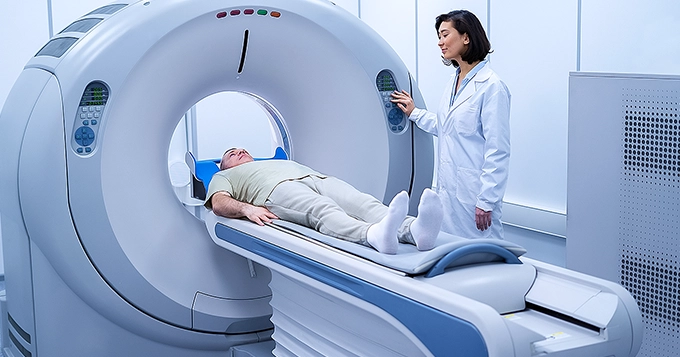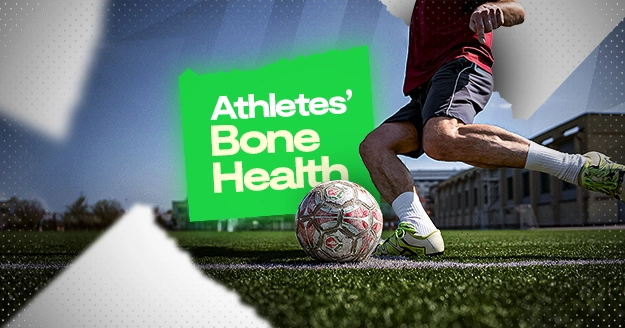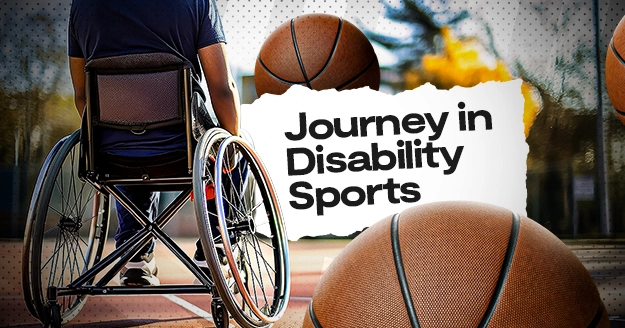Why is bone health important for athletes?
- Reduced Risk of Injuries
Strong bones are less prone to fractures and stress injuries. Athletes subject their bodies to intense physical activity, including high-impact movements and repetitive motions, which can strain bones. Good bone health helps minimize the risk of fractures and injuries, allowing athletes to train and compete at their best.
- Optimal Performance
Healthy bones support the muscles and provide a stable framework for movement. Athletes rely on their skeletal system to generate power, absorb shock, and maintain balance and coordination during training and competition. Weak bones can impair performance and hinder athletic abilities.
- Recovery and Healing
Injuries are inevitable in sports, and bone health plays a crucial role in the recovery process. Strong bones facilitate faster healing, enabling athletes to return to training and competition sooner after injury. Poor bone health may prolong recovery times and increase the likelihood of recurring injuries.
- Long-term Health and Career Sustainability
Maintaining bone health is essential for the long-term well-being of athletes. Over time, repetitive stress and physical demands can lead to wear and tear on the bones, increasing the risk of degenerative conditions such as osteoarthritis. You can also consult with healthcare professionals for a tailored approach to maintaining bone health.
By prioritizing bone health, athletes can prolong their careers and enjoy an active lifestyle beyond their competitive years.
- Nutrient Absorption and Energy Metabolism
Adequate bone health is closely linked to overall nutritional status and metabolism. Certain nutrients, such as calcium, vitamin D, and magnesium, are essential for bone formation and maintenance. Athletes must consume a balanced diet to support bone health and ensure optimal nutrient absorption for energy production and muscle function.
Now you know some of the reasons why maintaining strong and healthy bones is crucial for athletes. This time, let’s explore some effective strategies athletes can incorporate into their routines to enhance bone health.
How to Increase Bone Strength?
Bone health is a critical aspect of athletic performance and overall well-being. Athletes subject their bodies to rigorous physical demands, increasing the importance of maintaining resilient and robust bones. Poor bone health can lead to injuries, hinder performance, and impact long-term career sustainability. Therefore, implementing strategies to improve bone health is essential for athletes across all sports disciplines.
1. Nutritional Considerations:
How to increase bone strength naturally? First, you’ll need to look at what you’re putting inside your body.
A. Adequate Calcium Intake:
Calcium plays a crucial role in strengthening bones, with approximately 98% of the body’s calcium stores residing in the bones. When the diet lacks sufficient calcium, the body may draw calcium from the bones to fulfill other bodily requirements, gradually weakening them.
How much calcium do you need each day?
The Recommended Dietary Allowance (RDA) for calcium is 1,000 mg per day for women under 50 and men under 70. Women over 50, especially athletes, should aim for 1,200 milligrams due to increased bone remodeling during menopause. Many struggle to reach these levels, especially if they avoid dairy. Surveys show a significant portion of Americans don’t meet their daily calcium needs.
This recommended intake assumes we absorb around 30% of dietary calcium, similar to dairy products. Our biological calcium need is about 250 to 300 milligrams per day. Recommendations may vary based on individual health, diet, and consultation with a healthcare provider.
While there’s no scientific evidence athletes need more calcium than others, it’s vital for everyone to meet their daily calcium requirements for strong bones.
How would you know if you’re calcium deficient?
Over time, inadequate calcium intake can weaken bones and increase the risk of osteoporosis, resulting in brittle bones. Severe calcium deficiency may manifest as numbness, tingling in the fingers, muscle spasms, and irregular heart rhythms. However, there are typically no immediate, noticeable symptoms of calcium deficiency, leading many individuals to unknowingly consume insufficient amounts of calcium.
What are excellent sources of calcium for athletes?
- Dairy products
- Fortified plant-based milks
- Leafy greens
- Tofu, tempeh, and edamame
- Canned fish with edible bones
- Nuts and seeds
- Fortified foods such as breakfast cereals and orange juice
- Calcium bone strength supplement
B. Vitamin D Supplementation:
You can also supplement with vitamins for bone strength, such as vitamin D.
Vitamin D plays a vital role in facilitating the absorption of calcium from the intestines into the bloodstream. Without a proper amount of vitamin D, the body cannot effectively utilize the calcium obtained from dietary sources, even if intake is adequate.
Vitamin D is also essential for the process of bone mineralization, where phosphorus and calcium are deposited into the bone matrix, contributing to bone strength and density. Insufficient vitamin D levels can lead to softer, weaker bones, increasing athletes’ risk of fractures and osteoporosis.
Regular monitoring of vitamin D levels and supplementation if deficient is recommended to optimize bone health.
C. Balanced Diet:
A balanced diet rich in magnesium, phosphorus, vitamin K, and protein supports overall bone health through various mechanisms.
- Magnesium contributes to bone density and strength by aiding in the absorption and utilization of calcium, the primary mineral in bone tissue.
- Phosphorus plays a crucial role in bone mineralization, forming a structural component of hydroxyapatite crystals within the bone matrix.
- Vitamin K promotes bone formation and mineralization by facilitating the synthesis of osteocalcin, a protein essential for bone metabolism.
- Protein provides amino acids necessary for collagen synthesis, the protein matrix that gives bone its structure and resilience.
These nutrients and vitamins for bone strength can be found in foods, but you can always consider taking supplements if you can’t get the proper amount. However, always consult your doctor before starting any bone strength supplement.
2. Strength Training and Weight-Bearing Exercise:
A. Resistance Training:
Resistance training involves performing exercises that challenge the muscles by using external resistance, such as resistance bands, weights, or body weight. It typically includes exercises targeting major muscle groups, like squats, deadlifts, lunges, and overhead presses, which exert mechanical stress on bones, prompting them to adapt and become stronger.
This type of training stimulates bone remodeling and increases bone density, leading to stronger and healthier bones. By gradually increasing the intensity and volume of resistance training over time through progressive overload and periodization strategies, athletes can optimize bone adaptation while minimizing the risk of injury.
B. Plyometrics and Impact Activities:
Plyometrics and impact activities are dynamic exercises that involve rapid muscle contractions and high-impact movements. These exercises promote bone strength, coordination, and neuromuscular control. Activities like jumping, bounding, and agility drills stimulate bone density and enhance overall bone health. It is very crucial to gradually increase the intensity and volume of plyometric training to prevent overuse injuries and allow for proper recovery between sessions.
3. Injury Prevention and Recovery:
A. Proper Technique and Form:
Proper technique and form are essential in athletics to minimize the risk of injuries. Athletes should receive thorough coaching and instruction to ensure they perform exercises correctly. Correct movement patterns reduce the likelihood of stress fractures and overuse injuries that can result from poor biomechanics or improper form.
B. Rest and Recovery:
Rest and recovery are crucial aspects of athletic training that support bone health and overall performance. Adequate rest intervals between training sessions provide the necessary time for bone remodeling and repair, allowing bones to adapt and become stronger.
Additionally, incorporating active recovery techniques such as low-impact activities, foam rolling, and stretching helps promote circulation, alleviate muscle soreness, and enhance recovery processes.
By prioritizing rest and recovery, athletes can optimize their training adaptations and reduce the risk of overuse injuries, ultimately supporting long-term bone health and athletic success.
4. Monitoring and Evaluation:
It is recommended for athletes to undergo regular health evaluations to monitor bone health among other health metrics.
A. Bone Density Screening:
Bone density screening involves periodic assessments of bone mineral density using techniques like dual-energy X-ray absorptiometry (DEXA) scans. These screenings help identify athletes who may be at risk of conditions such as osteopenia or osteoporosis, where bones become weak and prone to fractures.
Early detection allows for targeted interventions, such as dietary modifications, supplementation, and tailored exercise programs, to prevent further bone loss and maintain skeletal health. This proactive approach can help athletes maintain strong bones and reduce the risk of injuries associated with compromised bone density.
B. Individualized Approach:
An individualized approach to bone health involves considering unique factors such as age, sex, genetics, training history, and injury risk when developing strategies for athletes.
By collaborating with sports medicine professionals, nutritionists, and strength coaches, personalized plans can be tailored to meet athletes’ specific needs and optimize their bone health. This customized approach ensures that interventions are targeted and effective, ultimately supporting athletes in achieving their performance and long-term health goals.
Does Bone Density Affect Weight?
While bone density does contribute to overall body weight, its impact is relatively minor when compared to other factors such as muscle mass and fat mass. Bone density refers to the amount of bone mineral in bone tissue, measured as bone mineral density (BMD). It’s an important component of overall body composition, which also includes muscle mass, fat mass, and other tissues.
- Bone Mass
Individuals with higher bone density have greater bone mass, contributing to total body weight. Therefore, those with higher bone density may weigh slightly more than individuals with lower bone density, assuming all other factors are equal.
- Body Composition
Changes in bone density can influence body composition, especially if bone density decreases due to aging, hormonal changes, or certain health conditions. Though a decrease in bone density could lead to a slight reduction in overall body weight, this change is typically a small fraction of total body weight.
So does bone density affect weight? Yes, bone density can affect weight, albeit indirectly.










